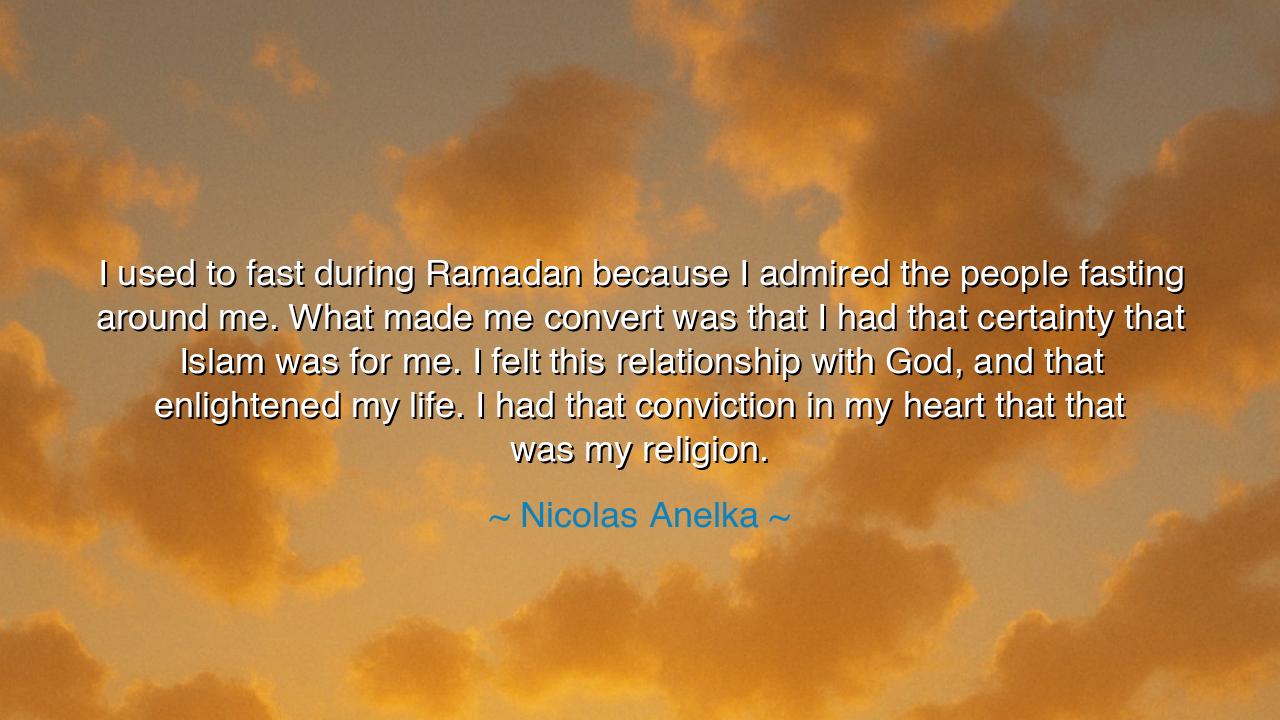
I used to fast during Ramadan because I admired the people
I used to fast during Ramadan because I admired the people fasting around me. What made me convert was that I had that certainty that Islam was for me. I felt this relationship with God, and that enlightened my life. I had that conviction in my heart that that was my religion.






When Nicolas Anelka, the French footballer once famed for his brilliance on the pitch and his quiet depth off it, said, “I used to fast during Ramadan because I admired the people fasting around me. What made me convert was that I had that certainty that Islam was for me. I felt this relationship with God, and that enlightened my life. I had that conviction in my heart that that was my religion,” he was not merely describing a change of creed — he was describing the awakening of the soul. His words speak of a journey from admiration to conviction, from imitation to faith — a transformation that countless seekers, in every age, have known when they encounter truth that touches the heart rather than the mind alone.
In his early years, Anelka was surrounded by the rhythm of faith — the fasting of Ramadan, the humility of prayer, the quiet dignity of those who sought God in discipline and devotion. He observed, he respected, and he partook — not yet out of belief, but out of reverence for the believers. There is great beauty in this: for admiration is often the seed of enlightenment. To see goodness in others, to be moved by their sincerity, is the first call of the spirit — the whisper that says, “There is something higher here.” Thus began his journey, not in doctrine, but in observation, in the living example of faith made visible through others.
Yet, what he describes next is the moment of transformation that separates admiration from awakening: certainty. “I had that certainty that Islam was for me.” This was no intellectual argument, no persuasion from others — it was what the ancients called gnosis, a knowing of the soul that surpasses all debate. When such conviction rises, it does not shout; it simply is. It fills the heart like dawn fills the sky, dissolving doubt with quiet light. Anelka’s conversion was not born of pressure or convenience, but of conviction, that most sacred of human experiences: the heart’s recognition of its source.
Throughout history, the great transformations of the human spirit have followed this same path — from imitation, to understanding, to illumination. Consider Saint Augustine, who wandered through pleasure, philosophy, and pride before he found his peace in faith. For years he admired the discipline of believers without joining them. But when at last the truth struck him with the force of certainty, he wrote: “You have made us for Yourself, O Lord, and our hearts are restless until they rest in You.” Like Anelka centuries later, Augustine discovered that faith begins not in reason, but in relationship — the deep, personal connection with the Divine that transforms knowledge into light.
Anelka’s phrase — “I felt this relationship with God, and that enlightened my life” — reveals the heart of all true religion. It is not the outer form that redeems, but the inner connection. Fasting, prayer, and ritual are not ends, but bridges — doors through which the soul passes to touch the Infinite. When he speaks of being “enlightened,” he speaks as those before him who have felt the same fire — a radiance that does not blind but clarifies, that makes the once-ordinary world shimmer with meaning. For when one’s heart is awakened to the Divine, every act becomes sacred, and every breath a form of prayer.
The wisdom of his words, then, is not bound to Islam alone; it is universal. It tells us that faith cannot be inherited or performed — it must be felt. One may study theology for years and never believe; one may live simply and come upon truth in a single heartbeat. What matters is conviction, that quiet certainty that transforms the follower into the faithful, the observer into the believer. To find one’s religion, in whatever form, is to find the language of one’s own soul — the path that leads inward, where God has always been waiting.
Let this be the lesson for those who seek meaning in the noise of the modern world: look within. Admiration for others may begin your journey, but it is only when you listen to the still voice in your heart that you will find truth. Do not chase belonging in the eyes of others; seek it in the light of your own spirit. Whether through prayer, reflection, or compassion, let your relationship with the Divine be personal, not borrowed. For as Nicolas Anelka reminds us, faith is not found in imitation, but in conviction — and when conviction dawns, the soul at last is free, and life itself becomes illuminated.






AAdministratorAdministrator
Welcome, honored guests. Please leave a comment, we will respond soon